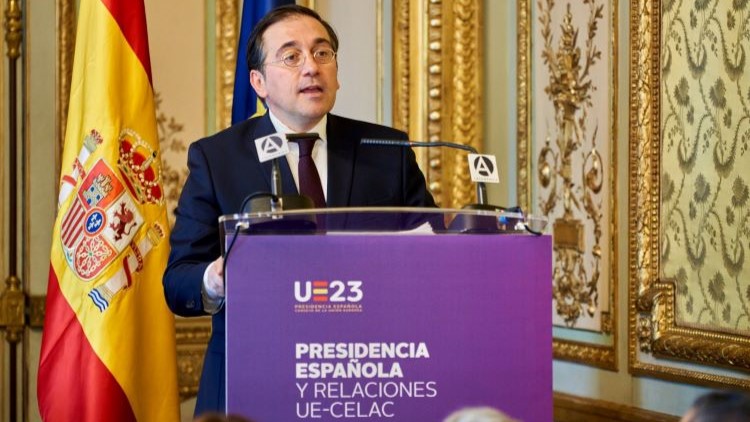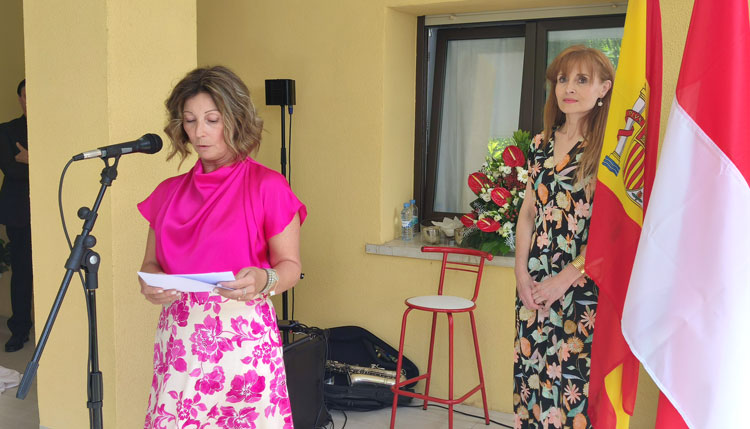The Diplomat
The Minister of Foreign Affairs, José Manuel Albares, met yesterday in Madrid with the Ibero-American ambassadors accredited in Madrid to explain the objectives of the Spanish Presidency and the EU-CELAC Summit and to promise them that 2023 will be “the year of Latin America in Europe”.
“Our Presidency will be the moment to relaunch the EU’s relations with Latin America, which is by far, as I often tell my colleagues in Brussels, the most Euro-compatible region on the planet, because we share values, we share interests, we share the way of looking at the world,” said the minister during the event Spanish Presidency and EU-CELAC relations, organized by Casa de America and which was followed by a colloquium between the former Secretary General of SEGIB Enrique V Iglesias; the writer Gioconda Belli; and the director of Casa America, Enrique Ojeda.
“We are natural partners united by cultural and historical ties, with deep social and economic ties,” he continued. “We are two shores united by the defense of values and principles that are common to us: democracy, the yearning for peace and the defense of an international order based on rules,” he added. “Europe must look across the Atlantic” because Russia’s war against Ukraine “has reminded us of the need to converge in defense of multilateralism and a rules-based international order,” he warned.
“That is why the first Summit of the Presidency will be that of CELAC, a summit that has been waiting since 2015 and today is more necessary than ever,” he continued. The Summit between the EU and the Community of Latin American and Caribbean States, the first in eight years, will take place in Brussels on July 17 and 18.
That summit, he continued, represents an “opportunity” to address “many challenges” that can only be faced “jointly”, such as climate change, food security, the migratory situation, global health, the defense of multilateralism and an international order based on rules or “the strengthening of democracies that have been called into question in both regions, reinforcing institutions and public policies”.
In any case, he warned, the EU-CELAC Summit “is not intended as an end in itself, but as a political platform for future interactions, to consolidate high-level and institutionalized political dialogue, with continuity beyond the Spanish Presidency”. To this end, he continued, it is necessary to “consolidate a positive, dynamic and forward-looking agenda, based on common objectives and interests”. “This opens the possibility of strengthening and opening a new page, a true alliance for which we are betting on mobilizing private investment,” he declared. “We cannot wait for other Spanish Presidencies to put at the center something that, for us, must also be a structural priority of the EU,” he added.
Another of the objectives of the Spanish Presidency, and “Spain will make every effort and commitment to this”, is to make progress in concluding pending trade agreements, such as those with Mercosur, Chile, Mexico and Central America, which are “essential to reinforce Europe’s own credibility in the region”, he said. “We have the opportunity for Europe to remain a key partner in Latin America, to reposition the EU in the region and to reposition Latin America in Europe,” he continued, “We must work to reduce the vulnerabilities that are joint in areas such as food or energy, we cannot close our eyes to Latin America, which has 45% of all agri-food trade” worldwide, he concluded.
The Minister also highlighted the role of Spain, a traditional “privileged partner” for Latin America in Europe and “bridge and gateway” between the two regions, to bring Europe and Latin America closer together, an effort that, he said, has already begun to bear fruit, such as “the recent Latin American tour” of the President of the European Commission, Ursula Von Der Leyen.






